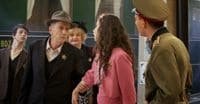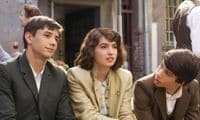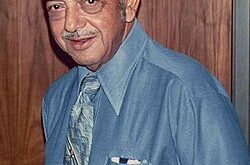Bulgaria’s Oscar candidate is a period drama about young love and wartime tragedy.
 Bulgarian Rhapsody is a Holocaust movie almost by default, but also a surprisingly warm and tender evocation of childhood innocence and first love. The Ladino-accented variation on this story is something we’ve not seen many times.
Bulgarian Rhapsody is a Holocaust movie almost by default, but also a surprisingly warm and tender evocation of childhood innocence and first love. The Ladino-accented variation on this story is something we’ve not seen many times.
Even though we all know how it ends, it’s interesting to see how the story plays out in Bulgaria, where Jews were persecuted but mostly allowed to live. While the political storm clouds gather over Sofia, Moni and Giogio listen to American jazz, dream of pin-up girls, and trade lines from Clark Gable andHumphrey Bogart movies. Despite its slow drift towards tragedy, the film recreates a sumptuous lost world of Bulgarian Jewish culture, its music and food, family gatherings and vibrant multi-cultural street life.
This sunny tone only fades in the final act, when Shelli comes to visit Moni’s family in Sofia. A love rivalry develops between the two boys just as the police begin rounding up Jews for deportation. Nitchev and his cinematographer Addie Reiss darken the film’s palette as the inevitably grim denouement looms, although there are some cautiously redemptive grace notes here too. Uniquely among Nazi Germany’s wartime allies, Bulgarians resisted the mass expulsion of their Jewish population, saving some 48,000 from almost certain death. Even so, they could not prevent the deportation of around 11,500 Jews from neighboring territories. Only a few hundred survived.
 A rites of passage story set against the backdrop of World War II, Bulgaria’s Oscar candidate in the Best Foreign Language race has already caused controversy at home. Rival filmmakers protested that 74-year-old director Ivan Nitchev is a member of the official body that selected his movie, though he reportedly played no part in the secret ballot process. A solidly middlebrow period piece with an old-fashioned moral message, Bulgarian Rhapsody is perfectly adequate Academy Awards material. But it might have made more sense for Bulgaria to put forward a more internationally acclaimed candidate, such as Maya Vitkova’s well-reviewed Sundance entry Viktoria or Milko Lazarov’s Venice prize-winner Alienation.
A rites of passage story set against the backdrop of World War II, Bulgaria’s Oscar candidate in the Best Foreign Language race has already caused controversy at home. Rival filmmakers protested that 74-year-old director Ivan Nitchev is a member of the official body that selected his movie, though he reportedly played no part in the secret ballot process. A solidly middlebrow period piece with an old-fashioned moral message, Bulgarian Rhapsody is perfectly adequate Academy Awards material. But it might have made more sense for Bulgaria to put forward a more internationally acclaimed candidate, such as Maya Vitkova’s well-reviewed Sundance entry Viktoria or Milko Lazarov’s Venice prize-winner Alienation.
A co-production with Israel, Bulgarian Rhapsody is Nitchev’s third installment in a loosely linked trilogy about the history of Bulgaria’s Jewish population, following After the End of the World (1999) and The Journey to Jerusalem (2003). It takes place in 1943, when Bulgaria is unwisely siding with Nazi Germany, and paying a heavy price as Allied bombs fall on the capital Sofia. Meanwhile, Germany is pressuring the authorities to begin rounding up and deporting their Jewish citizens.
 Nitchev compresses the wider racial politics of the era into a love triangle between three 17-year-olds. Moni (Kristiyan Makarov) is a shy young Jewish boy living in Sofia, Giogio (Stefan Popov) is his more worldly Bulgarian friend and Shelli (Anjela Nedyalkova) is his flirtatious cousin who lives across the border in the Greek coastal town of Kavala. To complicate matters, Gioigio’s father is a brutish anti-Semite who works for the government department in charge of deporting Sofia’s Jews to forced labor and death camps.
Nitchev compresses the wider racial politics of the era into a love triangle between three 17-year-olds. Moni (Kristiyan Makarov) is a shy young Jewish boy living in Sofia, Giogio (Stefan Popov) is his more worldly Bulgarian friend and Shelli (Anjela Nedyalkova) is his flirtatious cousin who lives across the border in the Greek coastal town of Kavala. To complicate matters, Gioigio’s father is a brutish anti-Semite who works for the government department in charge of deporting Sofia’s Jews to forced labor and death camps.
With its stagey look and schematic plotting, Bulgarian Rhapsody is a period Eurodrama with an emphatically old-school, novelistic feel. The young cast are charming enough, especially Makarov as the baby-faced hero, while Stephan Dimitrov’s score is a rich tapestry of Balkan folk and klezmer-style melodies. Nitchev’s movie is a handsome history lesson, but creaky and conventional, ultimately coming across more like a vintage TV miniseries than a serious Oscar contender.
Production companies: Cinepaz EOOD, Cinisima
Cast: Kristiyan Makarov, Stefan Popov, Anjela Nedyalkova, Tatyana Lolova, Moni Moshonov
Director: Ivan Nitchev
Screenwriters: Yurii Dachev, Tatyana Granitova, Jean Pierre Magro, Ivan Nitchev
Producers: Leon Edery, Moshe Edery, Nissim Levy, Shaul Scherze
Cinematographer: Addie Reiss
Editors: Tatyana Bogdanova, Isaac Sehayek
Production designer: Rossitsa Bakeva
Music: Stephan Dimitrov
Sales company: Cinepaz, Sofia
No rating, 108 minutes
Fuente: hollywoodreporter.com
 eSefarad Noticias del Mundo Sefaradi
eSefarad Noticias del Mundo Sefaradi

